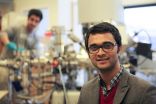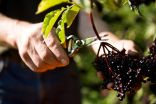(Press-News.org) This news release is available in German.
In 2003, Europe experienced a record-breaking summer, and many people feel that this summer is headed the same way. In the midst of this heatwave, the scientific journal Nature Geoscience has published a study that can help us to understand such extreme weather conditions. For around two years, an ETH research team has analysed climate data from all over the world in a bid to explain the driving force behind stable high-pressure systems. It has long been known that extremely stable high-pressure systems in the upper troposphere, that is five to ten kilometres up into the atmosphere, can trigger summer heatwaves. Researchers have termed these special high-pressure conditions 'blocking', since they deflect low-pressure systems and, as a result, may lead to warm weather patterns. These patterns are around 2,000 kilometres in diameter and can span across large swathes of Europe. They interrupt the typical westerly flow from the North Atlantic, which would otherwise determine the weather conditions in our region.
The opposite of sweating
While all research up to this point has attempted to explain blocking by focussing on the circulation of air masses in the upper troposphere, the Atmospheric Dynamics research team led by ETH professor Heini Wernli has now proposed a new approach. "We show that the ascension of air masses from the lower troposphere can also be a determining factor in the formation and perpetuation of such systems," says Stephan Pfahl, senior scientist in Wernli's team.
'Latent heat' plays an important role: clouds form in the ascending air masses, water vapour condenses and releases so-called latent energy. "That is the opposite of sweating, in which water evaporates and cools the body," explains Pfahl. The resultant heating of the parcel of air can lead to a further rise. The latent heat thus provides part of the force needed for the air masses to rise.
Delayed process
In their analysis of meteorological data from the past 21 years, ETH researchers have now discovered that in the three days before the air masses reach the blocking region, up to 45 per cent of air masses are heated through this process; in the week before this increases to as much as 70 per cent. It is easy to understand this through changes in the weather: clouds or areas of bad weather form over the Atlantic and, a few days later, the patterns appear over Europe with sunny weather. "The process is thus always delayed; in the week before the blocking occurs, far more than half of the air masses undergo this latent heating process," says ETH Professor Heini Wernli.
For 20 years, Wernli has specialised in the analysis of low-pressure systems, in which latent heat has long been recognised as an essential process. The research team has focussed on the phenomenon of blocking for a good ten years. "At the beginning we were all curious as to why the flow suddenly changed from westerly to another state," says Wernli. The current study has combined the findings from the analysis of low-pressure areas with those from the research into blocking.
Immense volumes of data analysed
The ETH Zurich research team analysed a huge set of data taken from ground-measurements, balloons, aircraft and satellites from the European Centre for Medium-Range Weather Forecasts in Reading, UK. New data on wind, temperature, cloud formation and humidity was received every six hours. Using trajectory calculations, Stephan Pfahl evaluated the movement of individual parcels of air, which contribute to the formation of blocking systems. More than 100 million trajectories were analysed.
The new findings may also prove useful in other areas of climate research. "There is more moisture in the air as the result of global warming. This causes more latent heat to be released, which could also lead to a change in the frequency of blocking weather conditions," says Pfahl. "But that is still highly speculative; we need to conduct further research into this." The weather forecast could conceivably benefit from the new findings as well, since it often misses the moment at which the blocking pattern forms or disintegrates, which can have a significant impact on weather developments. It remains to be seen how well the latent heat process can be reproduced in existing weather models.
Blocking also causes high fog
But blocking is not exclusively a summer phenomenon: in the winter months, blocking can cause the cold, high fog conditions with which we are so familiar in the Swiss Plateau, but which also occur all the way from the Po Valley in Italy up to northern Germany. "In other words, all those weather conditions about which people always complain", laughs Wernli - from extreme heat through to grey, cold winter weather.
INFORMATION:
Literature reference
Pfahl S, Schwierz C, Croci-Maspoli M, Grams CM, Wernli H: Importance of latent heat release in ascending streams for atmospheric blocking. Nature Geoscience, 20 July 2015, doi: 10.1038/ngeo2487
Researchers at the Babraham Institute and Cambridge Systems Biology Centre, University of Cambridge have shown that yeast can modify their genomes to take advantage of an excess of calories in the environment and attain optimal growth.
The ability to sense environmental nutrient availability and act accordingly is a critical process for all organisms. Changing behaviour in response to nutrients can occur at many levels: the activity of proteins can be varied or new genes can be activated to produce a different set of proteins. Research published in the latest issue of ...
A majority of men who have sex with men (MSM) and transgender women (TGW) at high risk for HIV infection took anti-HIV medication for pre-exposure prophylaxis (PrEP), most of the time, in a multi-site U.S. study examining use of this HIV prevention strategy outside of a clinical trial. The study, called the PrEP Demo Project, was funded by the National Institute of Allergy and Infectious Diseases (NIAID), part of the National Institutes of Health.
The study findings will be presented by Albert Liu, M.D., of the San Francisco Department of Public Health, at the 8th International ...
Children born with ADNP-related autism syndrome suffer from a heart-breaking combination of ambiguous developmental problems injurious to both their physical health and cognitive functioning. For parents, the mystery surrounding their infants' suffering can be even more agonizing than the syndrome itself, which has no known cure.
Recent research from Tel Aviv University and the University of Antwerp is easing some of that agony. Activity-dependent neuroprotective protein (ADNP), discovered by TAU's Prof. Illana Gozes 15 years ago, has now been shown by Prof. Frank Kooy ...
One of the enduring mysteries of the human experience is how and why humans moved from hunting and gathering to farming.
From their beginnings humans, like other mammals, depended on wild resources for sustenance. Then between 8,000 and 12,000 years ago, in a transitional event known as the Neolithic Revolution, they began to create and tend domestic ecosystems in various locations around the world, and agriculture was born.
Despite decades of research into this major human advancement, scientists still don't know what propelled it.
The recent work of a research ...
WASHINGTON, DC - July 21, 2015 - Each year, scientists create an influenza (flu) vaccine that protects against a few specific influenza strains that researchers predict are going to be the most common during that year. Now, a new study shows that scientists may be able to create a 'universal' vaccine that can provide broad protection against numerous influenza strains, including those that could cause future pandemics. The study appears in mBio, the online open-access journal of the American Society for Microbiology.
"The reason researchers change the vaccine every year ...
WASHINGTON -- Advertisers hoping to sway consumers might want to rethink running spots within media with violent or sexual themes, and might do better if the ads themselves have a G-rating, according to a study published by the American Psychological Association. Instead, violent and sexual media content may impair advertising's effectiveness and ultimately deter purchasing, the research found.
"We found almost no evidence that violent and sexual programs and ads increased advertising effectiveness," said Brad J. Bushman, PhD, professor of communication and psychology ...
Believe it or not: X-ray works a lot better on rocks than on paper. This has been a problem for conservators trying to save historical books and letters from the ravages of time and fungi. They frankly did not know what they were up against once the telltale signs of vandals such as Dothidales or Pleosporales started to spot the surface of their priceless documents
Now Diwaker Jha, an imaging specialist from Department of Chemistry, University of Copenhagen, has managed to adapt methods developed to investigate interiors of rocks to work on paper too, thus getting a ...
HOUSTON -- (July 21, 2015) - Phosphates artificially added to dairy and cereal products appear to cause bigger spikes in blood phosphorus levels than naturally occurring phosphates, potentially putting harmful stress on kidneys. Too much dietary phosphate stiffens blood vessels, enlarges the heart and is bad for bones, but a new study by Houston Methodist researchers suggests it matters where the phosphates come from.
The scientists' report will appear in the August 2015 issue of the American Journal of Clinical Nutrition (early online).
"The study suggests people should ...
The negative health effects of international air travel are well documented but now it seems that the common elderberry can provide some relief.
Associate Professor Evelin Tiralongo and Dr Shirley Wee from Griffith's Menzies Health Institute Queensland (MHIQ) have completed a clinical trial showing that an elderberry supplement can provide some protection from cold and flu-like symptoms following long-haul flights.
Intercontinental air travel can be stressful and affect a passenger's physical and psychological wellbeing. Whilst jet lag and fatigue remain the best known ...
A special type of synthetic sugar could be the latest weapon in the fight against superbugs.
A team of scientists from The University of Queensland and Queensland biotechnology company Alchemia have discovered a potential new class of antibiotics inspired by sugar molecules produced by bacteria.
New antibiotics to which bacteria are unlikely to develop resistance are urgently needed to combat the rise of superbugs - drug resistant bacteria.
The research, led by Professor Matt Cooper and Dr Johannes Zuegg from UQ's Institute for Molecular Bioscience (IMB) in partnership ...

